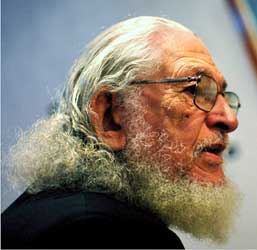Dennis Brutus, anti-apartheid fighter
Published Jan 15, 2010 7:15 PM
The following is excerpted from Patrick Bond’s obituary of his
teacher and colleague Dennis Brutus, a South African poet, anti-apartheid
fighter and internationalist known and admired by U.S. activists.
Dennis Brutus died at age 85 on Dec. 26, battling cancer,
climate change and capitalism.
Trying to keep up with the octogenarian after his 2005 move to Durban dazed
even the most Brutus-addicted staff at the University of KwaZulu-Natal Centre
for Civil Society — where he was honorary professor and our visionary
guru — and UKZN Centre for Creative Arts, for which he served as a
fixture at their famous Time of the Writer and Poetry Africa festivals.
At least one overarching impression sings out from the cacophony of warm
memories: the Brutus philosophy that genuine liberation — not the
half-measures won in 1994, when class apartheid replaced racial domination in
South Africa — represents a war to be waged on many fronts because as one
battle is won and many more usually lost, there are still others on the horizon
that make an engaged life fulfilling, that keep the fires of desire for social
change burning long into the night.
The denial of opportunities to play sports across Port Elizabeth’s
neighborhoods was Brutus’ youthful entry point into revolutionary
politics, initially with the Teachers League and then the Congress movement
centered on Nelson Mandela’s African National Congress.
In the process, Brutus received deep battlefield scars, suffering bannings
(both personal in 1961 and affecting most of his poetry until 1990); a 1963
police kidnapping in Maputo, Mozambique, followed by a near-fatal shooting
outside Anglo American’s central Johannesburg headquarters during an
escape attempt; imprisonment and torture from 1963-66 at Johannesburg’s
Fort Prison and on Cape Town’s Robben Island (he was next door to Mandela
much of the time); and alienating times in exile from 1966-1991.
Those three decades in the U.S. spent teaching at leading universities gave
Brutus opportunities for high-profile support to every crucial struggle: ending
the unfair incarcerations of Philadelphia poet Mumia Abu-Jamal, American Indian
Movement leader Leonard Peltier and Guantánamo Bay prisoners; halting
sweatshops; imposing Boycott/Divestment/Sanctions on Israel; building Burmese
solidarity; opposing Washington’s militarism by following Thoreau’s
lead and refusing to pay a portion of his taxes; attempting to prosecute George
Bush for war crimes; and supporting the successful Vieques protest against U.S.
Navy weapons testing on the Puerto Rican island.
Upon returning to South Africa in 1998, he and Archbishop Njongonkulu Ndungane
inaugurated Jubilee South Africa to demand rejection of inherited apartheid
debt and to then launch the World Bank Bonds Boycott.
Other SA-based campaigning included leadership in protests numbering 10,000
against the U.N.’s World Conference Against Racism in 2001 — for
failing to include Zionism and reparations for slavery, colonialism and
apartheid on the agenda — and 30,000 against the World Summit on
Sustainable Development in 2002 because of the U.N. turn to water
privatization, carbon trading and similar market-environmental strategies.
Brutus was subsequently the highest-profile plaintiff in the lawsuit filed by
Jubilee and the Khulumani Support Group for apartheid reparations, fighting not
only three dozen corporations which made profits and interest in SA prior to
1994, but also the Mbeki regime, which sided with the Bush regime and capital.
Last October [after President Thabo Mbeki was pushed out of office], Pretoria
finally reversed that position, to Brutus’ satisfaction.
For more information and a schedule of memorials for Brutus, see
www.ukzn.ac.za/ccs.
Articles copyright 1995-2012 Workers World.
Verbatim copying and distribution of this entire article is permitted in any medium without royalty provided this notice is preserved.
Workers World, 55 W. 17 St., NY, NY 10011
Email:
[email protected]
Subscribe
[email protected]
Support independent news
DONATE


